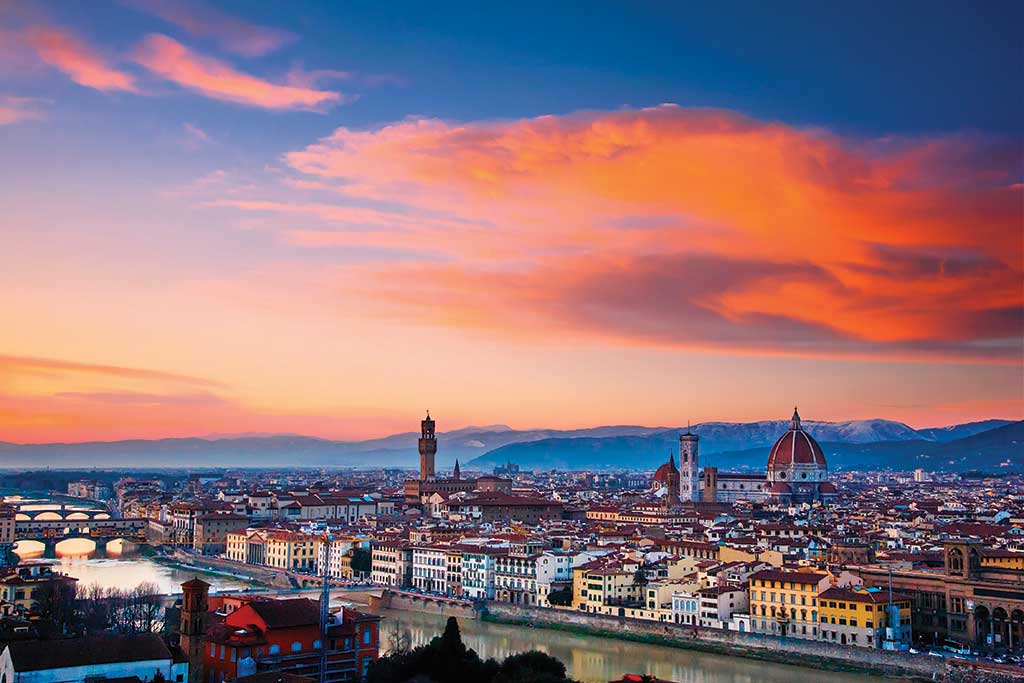Florence is relatively small and walkable. The ancient historic center houses some of the major sites and museums, which are must-sees whether this is your first trip or 20th.
My first trip to Florence was many years ago. I still have a travel book (The Guide: Walking Around Florence) from way back then, one with paper pages that is my “bible” to this awe-inspiring city nicknamed “The Birthplace of the Renaissance.” I’ve returned several times recently, and except for restaurants that may come and go, everything else has stayed the same, so the guidebook is still relevant today. But upon returning, I sensed something had changed. Not structurally, because the ancient buildings are historically protected, but still, I felt as though something was different, and I couldn’t quite put my finger on it. So what had shifted?
Florence is relatively small and walkable. The ancient historic center houses some of the major sites and museums, which are must-sees whether this is your first trip or 20th. Before we talk about museums, let me introduce you to the Firenzecard. You can purchase this card either online or in person at the Palazzo Vecchio located in the Piazza della Signoria or at several other locations. The card offers entrance into 72 different museums around town for 72 euros during a 72-hour period of time. And for an extra five euros, you can ride the buses for free during that time period. This was truly worth it. My travel mate, Bud, joined me on my most recent trip back and, of course, we didn’t hit 72 museums, but it did allow us to skip the long lines that are notorious at the more popular institutions.
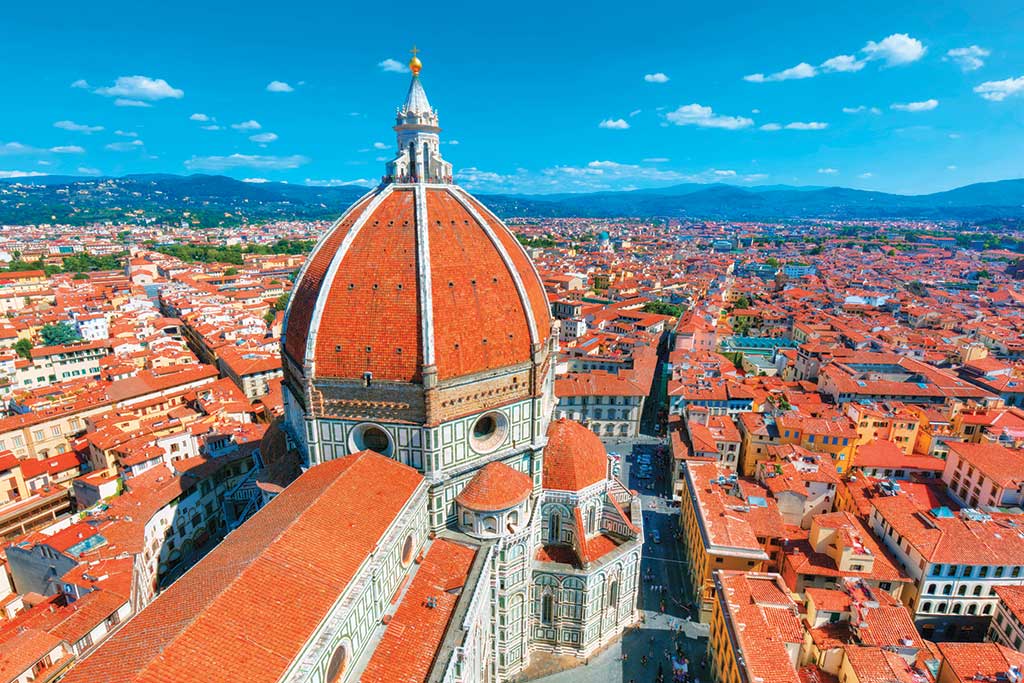
The Duomo
In Piazza Signoria, you’ll also find the Uffizi Gallery. It’s worth the trip just to see Botticelli’s “The Birth of Venus” or Caravaggio’s “Medusa.” Reminder, with the Firenzecard you skip the hour-long lines to enter this very popular museum.
Nearby is the famous Cathedral of Santa Maria del Fiore, also referred to as the Duomo. The first place of worship to occupy this footprint was the Episcopal Church of Florence in 394. Eventually the Cathedral of Santa Maria del Fiore was constructed in 1416. And to this day, it is still one of the most breathtaking and remarkable designs you’ll see in in the world. It’s massive! Giotto designed the campanile (the bell tower) and Filippo Brunelleschi, one of the founding fathers of the Renaissance, was the architect for the Cathedral’s amazing dome that seriously defies gravity.
You can climb the staircase up the dome, if you want to experience the amazing views from the top. It’s 463 steps, no elevator, and it’s not for those suffering from vertigo, claustrophobia, or fear of heights. There’s a very narrow winding staircase, with windows spaced far apart. As you reach the top of the dome, the stairwell narrows much further and the steps become quite steep. You feel as though you are in a vertical, medieval MRI, but the payoff is spectacular. Plus you get to see Vasari’s fresco of the “Last Judgment” up close and personal.
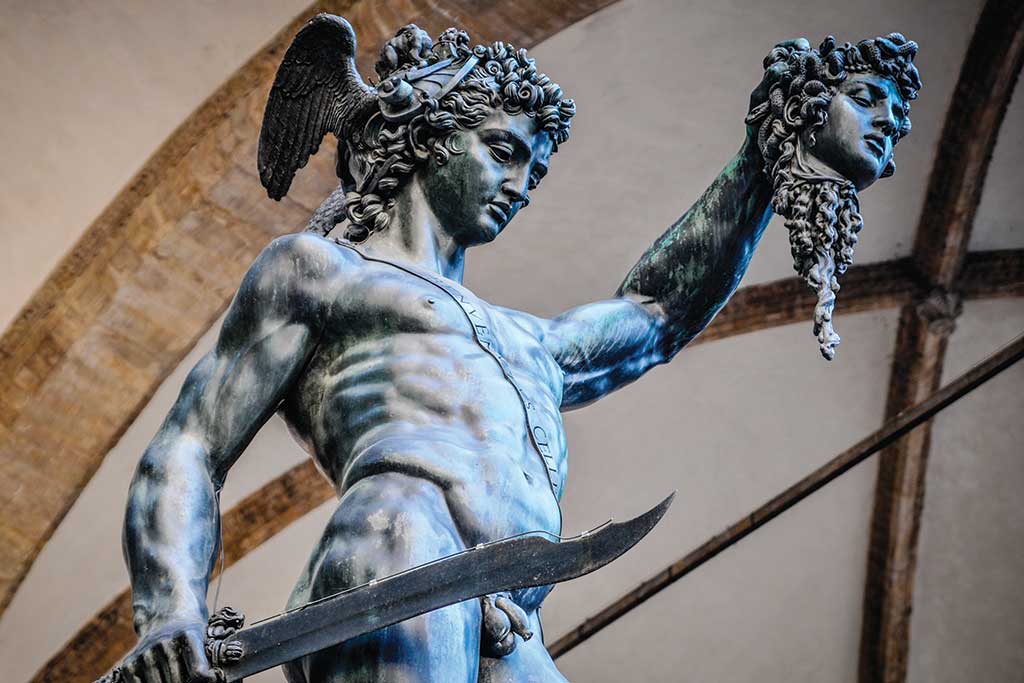
Cellini’s “Perseus with the Head of Medusa” in the Piazza Della Signoria
Also not to be missed are the bronze doors by Lorenzo Ghiberti that are on the outside of the octagonal Baptistery of Saint John. The entire complex sits in the middle of the Piazza del Duomo, a very lively and crowded square bordered by scores of restaurants, cafés, and souvenir shops.
Just a few blocks away is the Accademia Museum, which houses Michelangelo’s “David” as well as many of the artist’s unfinished works of art such as “The Prisoners.” Masterpieces in their own right, these works give us insight into Michelangelo’s creative process.
Take a short walk and you arrive at the Convent of San Marco. Many travelers miss this hauntingly tranquil and beautiful museum. The convent has gone through extensive changes and expansions since its beginning in the 12th century. Make sure you check out the rows of friar’s cells (tiny compartments to live and/or worship in) that were whitewashed and decorated with frescoes by Fra Angelico.
Not far from the Convent of San Marco is the Il Mercato Centrale. It’s a great place for lunch or dinner or something in between. It’s a giant food court with all types of food and wine bars. They even have cooking classes, as well as live music and artisan shops.
Just around the corner, past the train station, is my favorite square in Florence, the Piazza Santa Maria Novella. At the far end is the Italian Gothic-style church, the Santa Maria Novella. Inside this gorgeous church is one of the most priceless art treasures, “Giotto’s Crucifix,” gracefully hanging in mid-air above the church pews. Painted with tempera and gold on wood panel, it dates back to around 1290.
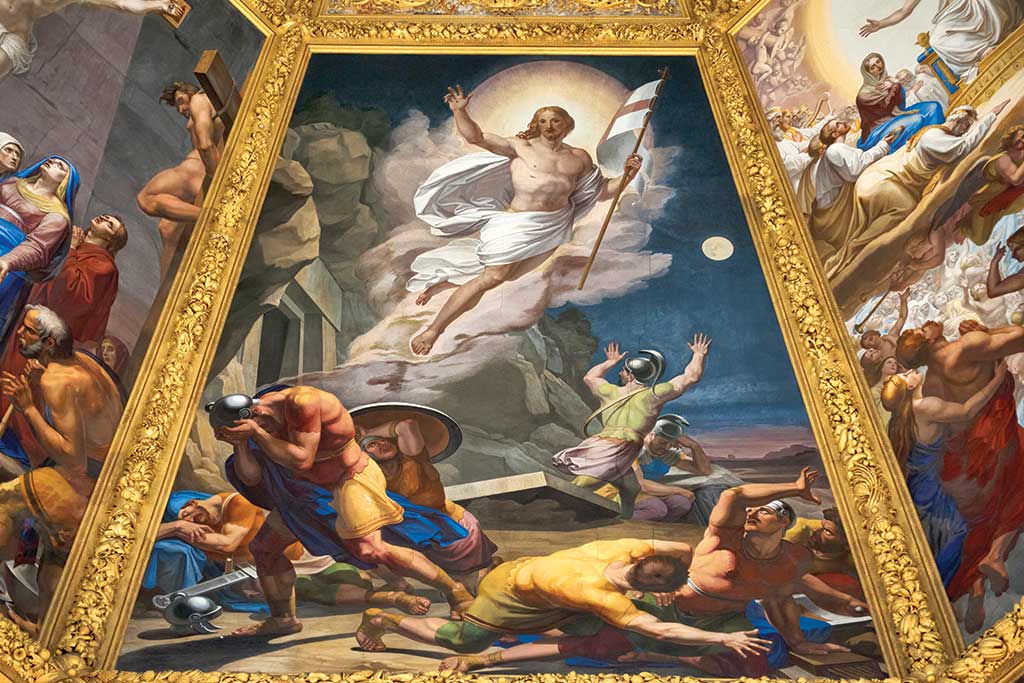
Ceilings of the Medici Chapels
Close by is the Piazza della Repubblica that was once the site of the city’s forum. It’s now a beautiful square surrounded by restaurants, stores, hotels, and street performers. Plus this is where Florence’s charming merry-go-round takes up residence, and at Christmas everything turns magical.
Bud and I decided to take part in an Urban Adventures Florence foodie walk hosted by Gemma. This experience is called their Aperitivo Time! Florence Wine Tour, and even if you know Florence a tour like this makes you feel like you are “a part of” the city. The history, knowledge, and humor are more interesting and real than anything you’ll find in a guidebook.
Meeting up with just two other guests, we visited three very different establishments. First stop was the elegant Procacci. Their specialties are finger sandwiches filled with the most heavenly truffle cream served with Prosecco. Next stop was a leisurely walk to the lively, La Procuitteria. We were treated to glasses of a full-bodied Chianti Classico wine and a massive board covered with everything from prosciutto, mortadella, and salami to roasted eggplant, zucchini and Tuscan bread smeared with amazing tapenades. Our final stop was the very popular Caffe Degli Artigiani. The night was topped off here with each of us ordering a Negroni and enjoying our cocktails outside in the Piazza della Passera. This was truly an enjoyable evening of culture, food, and spirits.
Connecting the historic center with the Oltrarno neighborhood is the Ponte Vechicco, a medieval stone bridge that crosses the Arno River. Originally the tenants were butchers, but now the bridge is full of jewelry, art, and souvenir shops. It’s always very, crowded, day and night, with tourists and street performers. You can take some great snaps of dramatic views of Florence from this vantage point. I must add that in December, close to Christmas, I’ve experienced the least amount of tourists. If you want to feel as though you have more of Florence to yourself, this is a great time to travel. It’s a bit rainier, but mild, and every street, large and small, is lit up for the Holidays.
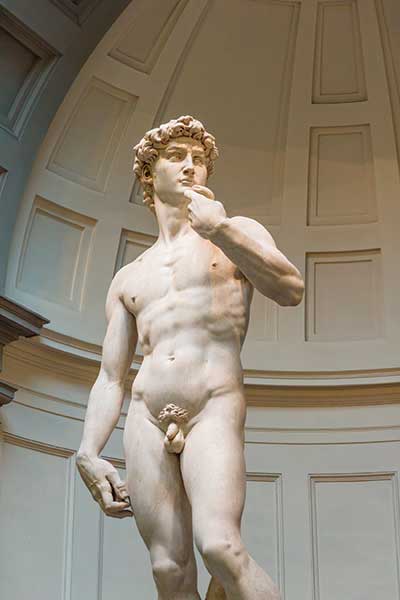
Michaelangelo’s “David”
The Oltrarno translates to “the other side of the Arno” where you’ll discover stunning palaces, piazze, gardens, and restaurants. This is the neighborhood where I prefer to stay. It’s quieter and gives you more of a local feeling.
We stayed at Claudia’s superb two bedroom, two bathroom with rooftop terrace apartment for rent in the Oltrarno, through Airbnb. If Airbnb or VRBO (vacation rental by owner) is not your thing, suggested hotels are the number one rated Hotel David, the amazing castle-like Toree Guelfa Hotel, or the elegant Westin Excelsior, which has a magical terrace high above the city with 360-degree views, great drinks, and the perfect location for picture taking, especially at sunset.
Here in the Oltrarno you’ll also find Piazzale Michelangelo. This overlook of Florence is a photographer’s dream, and the winding walk through this part of Florence is charming. You may want to have your map handy or pull up your GPS on your phone; the twisting streets can get a bit confusing. For those not up for the climb, there are several different buses that will take you right to the top. There’s a small restaurant up there and some souvenir vendors, but the solitude and beauty of the view, whether day or night allows you to reflect and look out upon the city of Florence and think about all of the artists, scientists, scholars, and chefs that have created here.
Upon descending, we decided to take a different route back toward our apartment and by chance we walked by Clet Abraham’s Studio. The artist was actually there that day, and we watched him work on a new piece. Mr. Abraham is a classically trained artist, but best known in Florence for his humorous street art, specifically, his traffic signs. He says, “I don’t damage the signs, because I use stickers, but I wake up attention and I create a dialogue.” I had turned searching for his street signs into a type of scavenger hunt. Once you’re on the lookout for them, you realize they are everywhere.
There’s also an artist called Blub, who prefers to remain anonymous. His work is titled L’Arte Sa Nuotare or Art Knows How to Swim. Peppered throughout the city, you’ll see famous artworks like “Girl with a Pearl Earring” or maybe it’s a portrait of Dalí painted on the sides of building…but they are wearing swimming masks. It’s all quite comical, and provides museum-weary tourists a non-museum-type venue to enjoy art. As my local Florentine friend Francesca says, “The snorkeling mask is a way to say that, even in crisis, art helps and it survives everything. So crisis = opportunity.”


